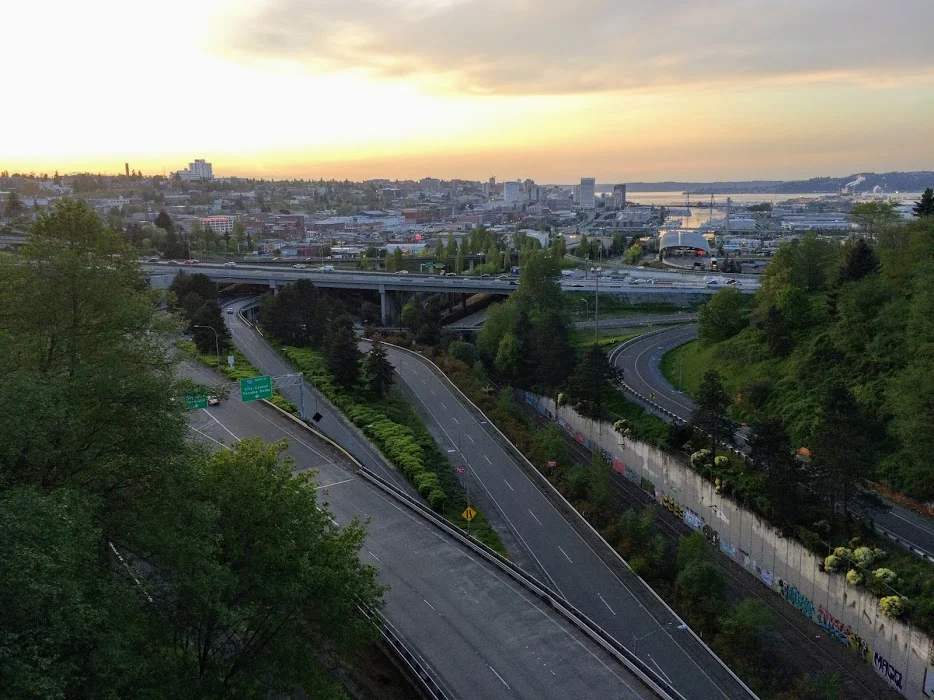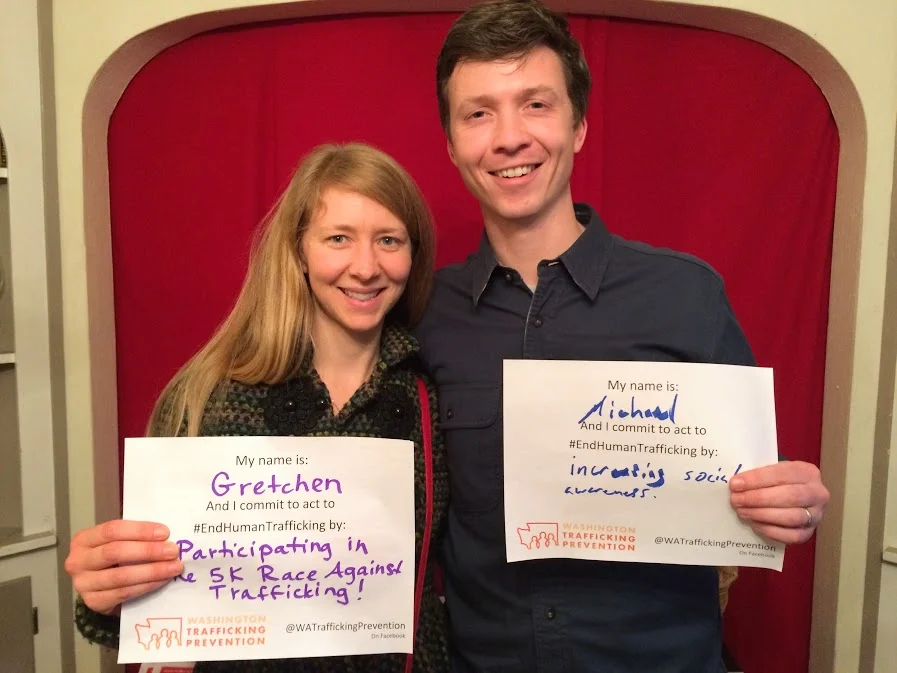Ordinary/Extraordinary people fill our city; we're what Tacoma is made of. We drive by each other on HWY 16, walk past each other on 6th Ave, stand behind each other in line at the grocery store, glance at each other in coffee shops, sometime we catch an eye. What if you could know more about some of the people around you? What if you could learn a little about how they experience Tacoma, how they find meaning in life, or even just where they like to go for a taco? We want to start sharing that here on our blog. So, meet Kerri, another one of us ordinary/extraordinary people of Tacoma.
Kerri Pedrick is the Executive Director of Washington Trafficking Prevention (WTP) so in the article you're going to:
get to know Kerri and her Tacoma story (including 5 of her favorite spots in the city)
find out more about human trafficking - what it means, how to recognize it, what you can do
learn about Washington Trafficking Prevention's programs, mission, and volunteer opportunities (head's up: WTP is hiring!!!)
Kerri's Tacoma Story
Before we learn about her work at Washington Trafficking Prevention, let's meet Kerri. (Don't you feel it's more polite to get to know a person before just jumping in and asking what they do for a living?) First of all, Kerri is generous, honest, and spirited. She's also extraordinarily passionate about serving young people and her community.
On the day of our interview Kerri sat at the table in the WTP Office getting updates on her phone regarding the advancing labor of a very close person in her life. Yep. She was directing a non-profit, giving an interview, and monitoring the progress of a loved one's contractions all at the same time. Later that day, she'd leave the office to perform the supportive role of a doula; just one more role she fills for close friends and family. Because as Kerri says, “Birth can be a really empowering thing, or can be a really disempowering thing.” Not far away, a new life was on its way into the world, in just a few hours a new Tacoma person would be born. In the meantime, we talked about Kerri's journey to Tacoma.
Kerri lives in Tacoma with her husband and 2 daughters. Aside from a year away earning her Master's Degree in Social Enterprise Administration at Columbia University, Kerri's been in Tacoma since 2004 (about 13 years!) when she moved here to attend Pacific Lutheran University.
When asked where else she's lived, Kerri shares, "I grew up in a rural community in Eastern WA - just outside of Okanogan near Malott. I also went to graduate school in New York, so I had the privilege of living in Manhattan for a year! It is definitely different than Tacoma or my hometown, but I have loved everywhere I've lived and traveled - I'm a "love of place" kind of person."
Home for Kerri in Tacoma is the Hilltop Neighborhood. "While I don't currently live there, I have lived, volunteered, attended church and worked mostly in the Hilltop neighborhood, so I would consider that 'home.'"
Kerri and I first met when we were both volunteering at the Peace Community Center in the Hilltop where she went on to work and volunteer for 7 years. We continue to connect at Peace Lutheran, one of those beautiful old white churches you see on corners all over the neighborhood.
What else makes Hilltop home for Kerri? "Knowing people when you walk the neighborhood, having people and youth shout at me from their house or front porch, and knowing families."
Sounds like home to me.
Kerri's 5 Tacoma Picks
1. Parks with spray grounds - we frequent Jefferson & Franklin most, my daughter loves playing!
2. En Rama for specialty/craft cocktails
3. Tres Hermanos Taco Truck (12th & Pine) for tacos
4. Waterfront for a family walk when the weather is nice
5. Primo Grill for a special occasion meal (try the crispy brussel sprouts and the fig/prosciutto pizza!)
We wanted to know if Kerri sees changes in Tacoma since she came here.
"Tacoma has changed, but also my perspective has changed. I came from a very small, rural community so Tacoma was very new to me when I moved here. I've fallen more and more in love with the city and the community - and all that comes with that, the good and the challenge, people who think like me and those with very different opinions."
Reflecting on her 13 years in this city, Kerri says, "Looking back, it felt like God was calling me here."
It's not difficult to see Kerri as a person responding to a calling. She's always lifting people up with her sincerity, hard work, warm energy, empathy, and humor. When asked about a cause, concern, or passion she wants to share, Kerri responded,
“My deep passion is about supporting young people and their families. I know how incredibly challenging it is to be a parent and be responsible for growth, care and development of a child. As a community we need to be a better ‘village’ for families and their kids and we need to tangibly lean in when they are struggling rather than blame parents or kids for challenges.”
Besides being a mom, wife, daughter, sister, twin, friend, doula, and volunteer, Kerri is also the Executive Director of Washington Trafficking Prevention (I think she's certified to officiate weddings too). I told you she's a cool lady.
Kerri & Washington Trafficking Prevention
Kerri in front of the working white board at the WTP Office in Tacoma, WA.
Now let's focus on human trafficking and the work Kerri and Washington Trafficking Prevention are doing to end it.
Washington Trafficking Prevention is a statewide non-profit based in Tacoma with an emphasis on empowering youth and mobilizing communities to end human trafficking.
Growing Staff: Kerri (the Executive Director), an Education Director, a Program Consultant, an Administrative Assistant, and they're hiring now for 2 full-time AmeriCorps VISTA positions!
35 Trained Facilitators (community members trained to implement youth education programs within organizations working with youth - such as schools and detention centers)
Countless Volunteers or "Coalition Members" (this could be you!)
About her time and work at WTP, Kerri writes, "I just celebrated my one-year anniversary with Washington Trafficking Prevention which is an organization working to prevent and end human trafficking in our state. We work to equip and empower the vulnerable (both those vulnerable to being trafficked and those who are potential exploiters or buyers) and engaging community. We know that it will take a long-term perspective if we are going to end the problem of exploitation and it will start with raising community awareness so we can acknowledge this is happening here in Washington and in our communities."
You and I, the people of Tacoma and Washington State, we're the community, and we're the ones who can participate in raising awareness. Let's begin by defining Human Trafficking.
What is Human Trafficking?
As you see in the information from WTP below: "Human Trafficking is modern-day slavery; the use of force, fraud or coercion to control others into forced labor or commercial sex acts." But that's not part of life in Tacoma, right?
Where does Human Trafficking Happen?
“The #1 thing I hear is ‘but that’s not happening here, right?’ Awareness isn’t everything, but it’s a first step.”
As Kerri says, “It’s happening in Tacoma, because it’s happening everywhere.” So yes, human trafficking happens in Tacoma. What we've learned in speaking with Kerri for this interview, and in attending her House Party for Hope earlier this year is that human trafficking knows no gender, age, color, border, or income-level. However, we've also learned that youth are particularly vulnerable.
What Can We Do?
Kerri writes, "I want community members to learn more and know there is something they can do to combat trafficking. We have community coalitions (one in Pierce County) that meet regularly. They can also engage in sharing what they learn with their peers and the young people they interact with. It is critically important that we role model healthy relationships and continue to care for the most vulnerable in our communities."
5 Things We Can Do:
Learn - know the signs of trafficking and have access to the hotline: 1-888-373-7888 OR Text HELP to BEFREE (233733). If someone is in immediate danger dial 911.
Act - Pierce County Coalition meetings are monthly on the 2nd Tuesday at the Salvation Army at S 12th & Union in Tacoma.
Share - Now that you know about trafficking, who will you share with? Let a youth know you care. Tell a close friend, your parents, anyone you know who works in schools, share on social media. Get the word out.
Volunteer or Work with WTP - Kerri shares, "WA Trafficking Prevention has two AmeriCorps positions open right now! The two full-time positions will start in August. We also have a variety of part-time volunteer roles (like working with our social media) available." Apply at traffickingprevention.org!
Oh yeah, also feel free to donate to Washington Trafficking Prevention. Or, volunteer to help raise money. There will be a fundraising event this summer - keep an eye out!
Know the Signs
(information provided by WTP materials)
A person may be a victim of trafficking if they are:
Unable to leave a job or owing a large debt to employer.
Not in control of their own schedule, speech, money, or ID.
In possession of multiple cell phones, excess cash, hotel keys.
A youth who is chronically truant, runaway, or homeless.
Kerri believes that no amount of sting operations, busts, or raids can end human trafficking (although they are a valuable part of the fight!).
“A cultural shift is required for this to end. Youth and all of us need to talk about consent, and need to know that all of us deserve healthy relationships. We don’t always model that for young people.”
Washington Trafficking Prevention's "Take On" Program Highlight
But how do you achieve, or even begin something as momentous, subtle, powerful, and comprehensive as a cultural shift? I think it's brave of Kerri and WTP to think in these terms. Wouldn't it be simpler to go for something more easily measurable, something with a box next to it that can be ticked? Maybe, but as the WTP informational materials state: The engine driving human trafficking is the profit traffickers make from the demand for the services of victims or the goods produced using trafficked labor. Okay. Kerri and WTP are saying it's the cultural shift that will reduce or obliterate the demand. A shift away from viewing people as commodities, a shift away from viewing children, youth, or any person as property, a shift toward healthy relationships, a shift toward consent.
WTP is focusing on young people through their youth empowerment program "Take On." When I asked Kerri what she's most proud of in her 1st year as the Executive Director of WTP, she said, "Finding a focus. WTP was doing so many good things, but not doing them all the way.” Because she comes from a background of working with youth, and training adults to work with youth, and because she believes in the power of young people, Kerri is right at home here.
WTP has established pilot programs for their Take On curriculum in the Yakima School District and the Thurston County Juvenile Detention Center. In Take On groups of young women, and groups of young men work through guided conversations and are encouraged to think critically about healthy relationships, violence prevention, and responsibility (personal and social). They explore and expose cultural influences on gender, objectification of people, and the harmful nature of trafficking. The aim to is empower young people to ally with others in the community in the fight against exploitation. WTP and Take On are all about culture-shifting from the grass roots level. Kerri describes a physical demonstration the high school students participate in during their final session that really sums up what WTP is all about:
This is us at Kerri's House Party for Hope in January. Gretchen missed getting in on this year's 5k (next year!) but we're trying to make up for it by doing our part to spread the word about WTP!
"It's a demonstration of the invisible 'game' of tug-of-war that is happening in our communities. On one side of the rope: volunteers representing the issues of human trafficking, objectification, exploitation - who easily win if no one is pulling on the other side of the rope. Then participants take turns picking up the other side of the rope and sharing the one thing they commit to do to end exploitation. Soon the young people win! The experience is powerful: individually we can make a difference and together we can win the war."
Kerri's message for the people of Tacoma:
“Human trafficking isn’t something that one person can end alone. It will take all of us. But TOGETHER, we can end exploitation and human trafficking.”
We'd like to end with this thought: What is the one thing you can do to tug on that other side of the rope?


























